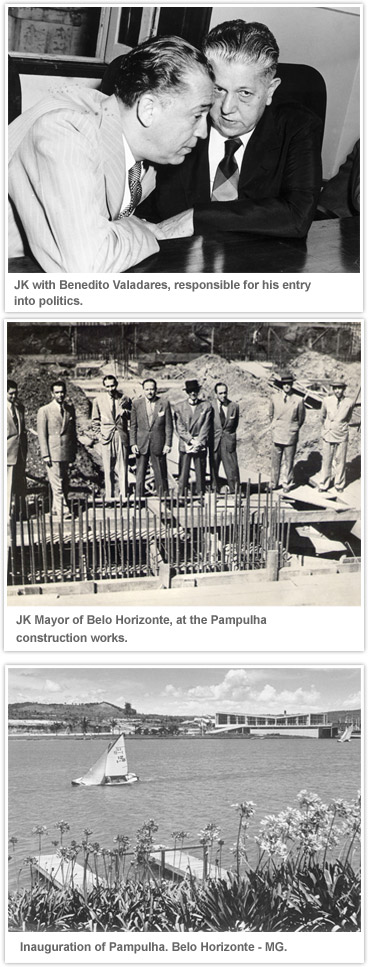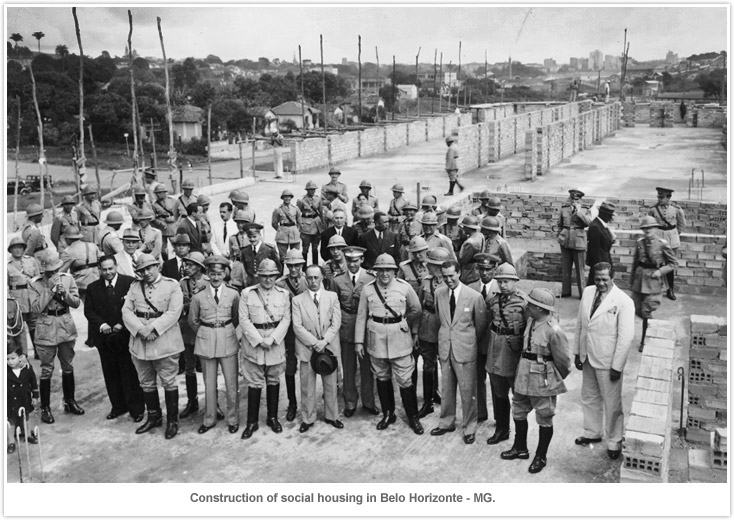Notícias
1940
 Appointed Mayor of Belo Horizonte by Valadares – In 1937, the “Interventores Estaduais” (federally appointed state governors) who had remained in office after the coup d’état and the institution of the “Estado Novo” (New State) were called “Governadores” (governors). Having remained in office, Benedito Valadares called upon Juscelino in 1940 to join his government, and offered him the position of mayor of Belo Horizonte. Of course, this call caught Juscelino by surprise, since he had always left it very clear that he was against Vargas’ dictatorship. However, given the governor’s insistence and the fact that he had agreed to hold elections in short time, Juscelino accepted the offer.
Appointed Mayor of Belo Horizonte by Valadares – In 1937, the “Interventores Estaduais” (federally appointed state governors) who had remained in office after the coup d’état and the institution of the “Estado Novo” (New State) were called “Governadores” (governors). Having remained in office, Benedito Valadares called upon Juscelino in 1940 to join his government, and offered him the position of mayor of Belo Horizonte. Of course, this call caught Juscelino by surprise, since he had always left it very clear that he was against Vargas’ dictatorship. However, given the governor’s insistence and the fact that he had agreed to hold elections in short time, Juscelino accepted the offer.
JK effectively resumed his political career on April 16, 1940, when his nomination was announced in the journal Minas Gerais. In his new position as mayor, JK carried out his duties in a manner that would also have a favorable impact on his later political life. During his term as mayor JK never stopped practicing as a physician and pursued both professions as much as possible. Juscelino only came to leave medicine for good in 1945. During this period, JK took over the position of first secretary of the recently founded Partido Social Democrata (PSD, Social Democratic Party), in addition to his position as mayor and job as physician. Juscelino was a democratic and dynamic mayor. His political agenda was diverse.
His political achievements can be grouped under three main headlines: (i) public services and embellishment of the city; (ii) incentives for cultural life; (iii) social assistance for the poor. In the area of public services, JK repaired, paved and constructed dozens of avenues. Among his achievements in these areas are: the paving of Avenida Afonso Pena, an important street for the traffic in Belo Horizonte; the opening of grand avenues serving as spokes for traffic and facilitating the access to the center of the city, such as Av. da Pampulha, Av.Teresa Cristina, continuing in Av. do Contorno, Av. Silviano Brandão, Av. Pedro II; and, last but not least, the extension of Av. Amazonas.
Still in the area of public services, Juscelino installed a canalisation system for fresh water supply in order to guarantee basic hygiene in Belo Horizonte. He constructed bridges and flattened surroundings of the city in order to integrate the city center with various suburbs. He initiated the underground electrical and telephone grids in Belo Horizonte.
One of his most important achievements in the area of public services was the construction of one of the great national architectural innovations: the suburb of Pampulha. Pampulha was mainly intended for tourism and leisure. Oscar Niemeyer, who would later plan the buildings of Brasília, designed this new kind of suburb. A large artificial lake was created, and residences and leisure amenities were built around it. An avenue was laid out to facilitate access to Pampulha. The work on Pampulha lasted a mere nine months. In record time, a recreational area and a new tourist spot for the citizens of Belo Horizonte was established.
During his term as mayor, Juscelino also contributed much to the cultural life in Belo Horizonte. Among his achievements in this area, to mention only the most significant advances, were the foundation of the Belo Horizonte Museum, the Instituto de Belas Artes (Institute of Fine Arts) and the Curso de Extensão Musical (an extension course in musical education).
In beginning the construction of the Teatro Municipal (City Theatre), in establishing the symphony orchestra, and in providing municipal support to a number of cultural institutions—JK intended to give rise to a new generation of young people loving the arts.
In the area of social assistance to the poor, JK improved the program Assistência Social (social assistance). Beyond his support for existing social institutions in Belo Horizonte, JK promoted the creation of new facilities and developed a network of organizations to provide social assistance to workers, including medical assistance, free hospital and dental treatment, access to inexpensive food, and other welfare oriented institutions.
Moreover, the municipal administration of Belo Horizonte built the Municipal Hospital in the suburb of Lagoinha during Kubitscheck’s term. The hospital was intended to provide medical assistance to workers. The building had 306 beds and the most modern equipment of the time. Whoever could not afford the medical costs, received treatment at the hospital through a well-devised insurance program that would take the gravity of the disease into account. The costs were shared between the municipal administration and the hospital Santa Casa de Misericórdia. JK also promoted a program of bars and restaurants for the people to facilitate the life of those who were mereley able to sustain themselves.
JK was an energetic mayor who paid attention to various fields of politics. The good results of his policies made his name known at a national level. This ultimately led his party colleagues at PSD to launch a campaign for his candidacy as Deputado Federal (a seat in the House of Representatives in National Congress) in 1945. This candidacy was the first step to his term as governor of Minas Gerais in 1950, and towards the presidency of the republic in 1955.

Notícias anteriores
- 16 de outubro de 2012
- Novo horário de funcionamento
- 12 de setembro de 2012
- Memorial celebra os 110 anos do nascimento de JK
- 30 de agosto de 2012
- Ministra da Cultura visita o Memorial JK
- 30 de agosto de 2012
- Memorial JK - Em preparação para os eventos internacionais que irão acontecer no Brasil
- 29 de junho de 2012
- Novo Procurador-Geral do Distrito Federal toma posse no Memorial JK
- 28 de junho de 2012
- A guardiã da memória de Brasília
- 25 de junho de 2012
- Noite de autógrafos no Memorial JK
- 12 de junho de 2012
- Revista GPS traz reportagem sobre Memorial JK
- 23 de maio de 2012
- Memorial JK participa da Semana de Museus
- 3 de maio de 2012
- Memorial ganha nova escultura de JK



